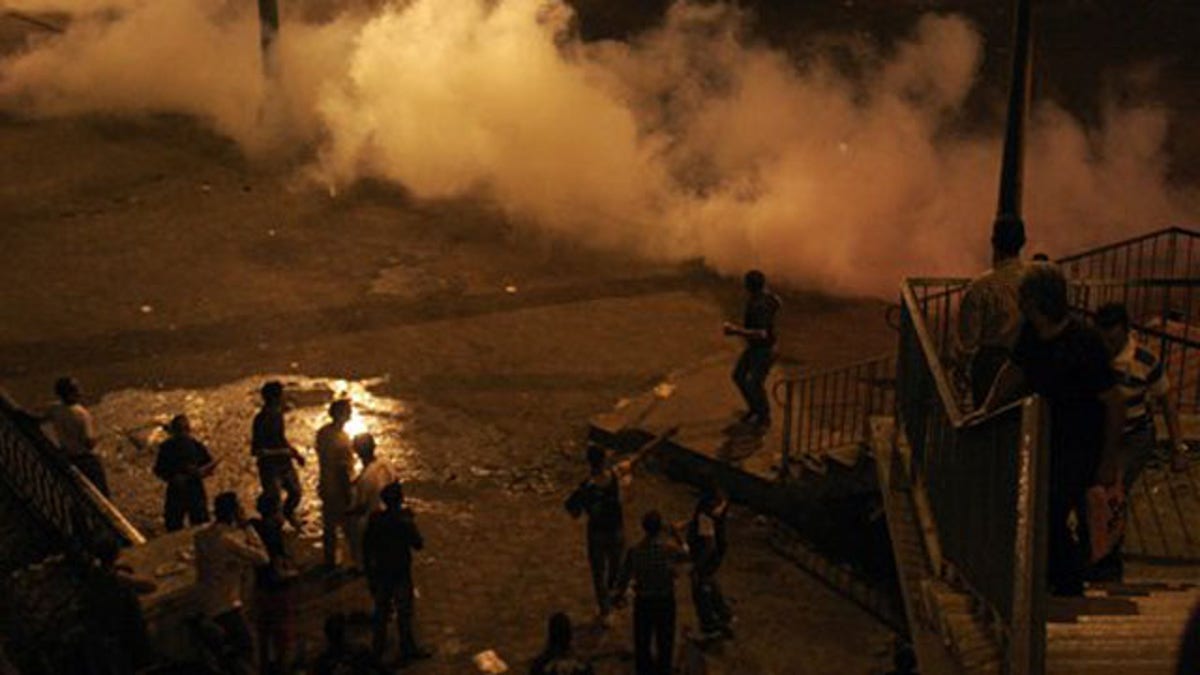
Smoke from tear gas fills the street as protesters clash with Egyptian security forces in Cairo Egypt, Sunday, Oct. 9, 2011. (AP)
In the eight months since the Egyptian Revolution, radical Islamic groups are rising to power, the army seems unwilling or unable to stop a growing rash of sectarian violence and the long-standing friendship between the U.S., Israel and Egypt is in serious question.
“I am the enemy of democracy,” Hesham al Ashry said in an interview with Fox News in his Cairo tailor shop. The devout Muslim is a main organizer in a group called the Salafists, which is working to bring Shariah law to Egypt. They, along with the Muslim Brotherhood, have risen quickly in the past eight months to fill the power vacuum left in post-Mubarak Egypt.
The massive change has billionaire tycoon and financier of the revolution Naguib Sawiris now calling Egypt’s future "dim ... bad."
Mubarak’s heavy handed security apparatus kept groups like the Salafis on a tight leash; now free to organize and recruit the Salafists and Brotherhood have quickly climbed to the top of the political food chain with organizational help and financing from supporters in the Gulf states.
“This is a big opportunity and it's not going to go back. This was mentioned by the Prophet Mohammed. Peace be upon him. He said this was going to happen,” al Ashry said, speaking of the Arab Spring and the opportunity for groups like his to organize.
The past eight months have given a scary preview of what al Ashry’s opportunity might mean. It was a Salafy Cleric who called for the attack on the Israeli Embassy in Cario, the rocket and suicide bomb attack on a southern Israeli highway which killed 8 and injured more than 40 was launched from Egypt’s Sinai Peninsula, and it was the Army which intervened in a peaceful Coptic Christian protest killing more than two dozen.
“They (the army) are completely frantic, they are (overwhelmed) by these every week demonstrations…the country is going bust. The economy is going down. They are unable to get it to rest (stop),” Sawiris, who says there is only a 20% chance of next month’s election producing a liberal or secular Muslim government, said.
Egypt’s first parliamentary elections are scheduled for late-November and many have warned they will become a flash point for the type of sectarian violence that left more than two dozen Coptic Christians dead. While al Ashry blames the Coptics for burning their own churches down in a sympathy ploy, it's widely accepted that fundamentalists from the Muslim Brotherhood or Salafists are responsible for burning down a number of a Coptic churches. The church burnings have brought the Christians out in force beginning a cycle of violence which the army seems unable, or unwilling, to stop.
“It is madness to hold elections in that short of a time. No security in the country. Anybody can do anything in Egypt with impunity,” said Coptic Christian politician Michael Muenier.
Egypt received $1.5B in foreign aid from the United States, making it one of the largest recipients in the world.
Much of the aid comes in the form of military hardware and training.
Since Egypt’s peace treaty with Israel and the rise of President Mubarak, Egypt has functioned as a key U.S. ally in the region and has done much of Washington’s bidding, but the recent developments have put the special relationship into serious question.
The Army has yet to arrest anyone for the string of Church burnings or punish any of the soldiers involved in the Coptic massacre in early October.
Despite pleas from the United States, Egypt has continued to hold an American/Israeli citizen accused of spying, and the Army leadership has failed to secure arms smuggling/militant activity in the Sinai Peninsula.
This combination creates a new dynamic in the Middle East as Egypt no longer walks in step with her Western benefactors.
For example, democratic elections long promised by the military already have Christians crying foul. "You are telling me the military just ran over 30 people with their tanks and we are going to feel comfortable going to elections," Muenier who also predicts a win by the Muslim Brotherhood, said.
As for what’s next if al Ashry and his followers get their way, "instead of one Iran …you have two."
